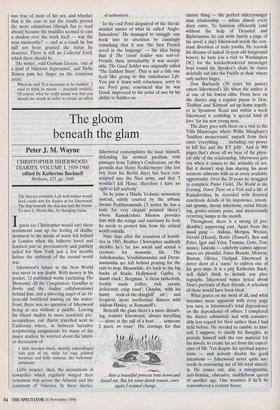The gloom beneath the glam
Peter J. M. Wayne
CHRISTOPHER ISHERWOOD: DIARIES, VOLUME I, 1939-1960 edited by Katherine Bucknell Methuen, £25, pp. 1048
The literary erstwhile Left well-wisher would Seek vainly now for Auden or for Isherwood. The dog beneath the skin has had the brains To save it, Norris-like, by changing trains.
Iguess (as Christopher would say) these sentiments sum up the feeling of disillu- sionment in the minds of many left behind in London when the hitherto loved and lionised pair so provocatively and publicly sailed for New York just a few months before the outbreak of the second world war.
Isherwood's future in the New World was never in any doubt. With money in his pocket, 12 published works (including The Memorial, All the Conspirators, Goodbye to Berlin and the Auden collaborations) behind him, and a shivering angel of an 18- year-old boyfriend waiting on the water- front, there was no question of Isherwood being at sea without a paddle. Leaving his friend Auden to more academic pre- occupations, our diarist travelled west to California where, in between lucrative scriptwriting assignments for many of the major studios, he worried about the interi- or decoration of
a little wooden shack, daintily camouflaged with pots of ivy, white fur rugs, painted furniture and frilly curtains, like ballerinas' petticoats.
Little wonder, then, the accusations of cowardice which regularly winged their vehement way across the Atlantic and the continent of America. In these diaries, Isherwood contemplates the issue himself, defending his avowed pacifism with passages from Tolstoy's Confessions, on the grounds that Heinz Neddermeyer (the lost boy from his Berlin days) has been con- scripted into the Nazi army, and that 'I wouldn't kill Heinz, therefore I have no right to kill anybody'.
So he joins a Hindu Vedanta monastery instead, subtly courted by the urbane Swami Prabhavananda CI notice he has a taste for very elegant pointed shoes') whose Ramakrishna Mission provides him with the refuge and sanctuary he feels he needs to protect him from the critical world outside.
Nine days after the cessation of hostili- ties in 1945, Brother Christopher suddenly decides he's far too social and sexual a creature for monastic life. The Ashokanadas, Vividishanandas and Devat- manandas are left behind praying for the rain to stop. Meanwhile, it's back to the big bucks of Studio Hollywood: Garbo, 'a dumb cluck'; Bergman, 'a clean tablecloth, freshly made coffee, rich cream, deliciously crisp toast'; Chaplin, 'with his funny cock-of-the-dunghill air'; and frequent, more intellectual dinners with Aldous Huxley, at Romanoffs.
Beneath the glam there's a more disturb- ing, seamier Isherwood, 'always travelling — alone at the rail of a boat . . . someone I meet, en route'. His cravings for that . . . then a beautiful princess bent down and kissed me. But for some dumb reason, once again I resisted change. . . elusive thing — the perfect older/younger man relationship — infuse almost every diary entry. To function efficiently (and without the help of Dexamyl and Biphetamine he can write barely a page of his novel a day) Isherwood needs the con- stant diversion of male youths. He records his dreams of naked 16-year-old fairground boxers; he lusts (on a visit to Washington DC) for the knickerbockered messenger boys round the Speaker's chair; he stares dolefully out into the Pacific at dusk 'where only surfers linger. . . '
Don Bachardy (30 years his junior) enters Isherwood's life when the author is at one of his lowest ebbs. From here on the diaries sing a regular paean to Don. `Dobbin' and ‘Kittycaf set up home togeth- er in Sycamore Road and within a week Isherwood is confiding 'a special kind of love' for his new young man.
The diary goes with them on a visit to the Villa Mauresque where Willie Maugham's `faultless menservants' unpack from their cases 'everything . . . including our power to kill lice and the KY jelly'. And in 900 pages that's about all we hear of the physi- cal side of the relationship. Isherwood gets coy when it comes to the actuality of sex. But it doesn't stop him sharing his most intimate ailments with us at every available opportunity. Over the 20 years he struggled to complete Prater Violet, The World in the Evening, Down There on a Visit and a life of Ramakrishna, he recorded with doctoral exactitude details of his impotence, intesti- nal spasms, throat infections, rectal bleed- ing, genito-urinary pains, and mysteriously recurring lumps in the mouth.
Throughout, there is a strong (if pre- dictable) supporting cast. Apart from the usual gang — Aldous, Morgan, Wystan, Gerald (Heard), Bertie (Russell), Ben and Peter, Igor and Vera, Truman, Gore, Ten- nessee, Lincoln — celebrity cameo appear- ances are plentiful. Enter Brando, Monroe, Burton, Olivier, Gielgud. Isherwood is never short of a 'name' to enliven one of his grey days. It is a pity Katherine Buck- nell didn't think to include any pho- tographs. Isherwood waxes lyrical about Don's portraits of their friends. A selection of these would have been ideal.
What grates on me most of all, and what becomes more apparent with every page you turn, is Isherwood's total dependence on the dependence of others. I completed the diaries exhausted, and with consider- ably less regard for their author than I had held before. He needed to ramble to him- self, I suppose, to clarify his thoughts, to provide himself with the raw material for his novels, to create his art from the experi- ence of life. Yet despite his spiritual aspira- tions — and nobody doubts his good intentions — Isherwood never quite suc- ceeds in convincing me of his total sinceri- ty. He comes out, alas, a misogynistic, anti-Semitic, obsessive, middlebrow queen of another age. One wonders if he'll be remembered a century hence.


















































































 Previous page
Previous page